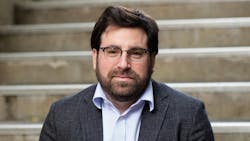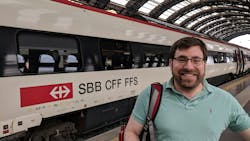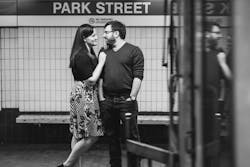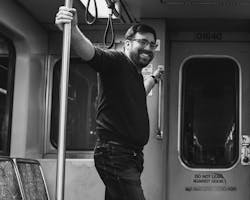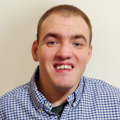One word to describe yourself: Muppet
Alma Mater: MIT
Fast fact about yourself: I am a completionist; I love to do every little bit of something. Thus, I have walked every segment of every street in Cambridge, Mass., and I am working on sending a postcard from every postbox. I have also spent significant time onstage, including my favorite role as Luke Skywalker during a college production of Star Wars Trilogy: Musical Edition.
What’s your best experience on transit and what made it memorable? My wife and I had our engagement photos taken on the MBTA Red Line! She loves (and indulges) me very much!
Matthew Ciborowski most recently served as the vice president, planning and modeling at RSG where he led a national portfolio of experts while directing transformative efforts like Vermont’s Rail and Freight Plan, which seeks to help the state conform to new federal guidelines by leveraging the state’s rail network for both passenger and freight mobility in alignment with the Vermont Climate Action Plan. In addition to his strategic business oversight responsibilities, Ciborowski was deeply involved in every project, coordinating stakeholders, reviewing analytics and mentoring junior planners.
He began as a transit analyst in the private sector before moving into public service. For six years, Ciborowski worked for the commonwealth of Massachusetts, where he led statewide strategic planning initiatives while also spearheading major capital projects such as the Green Line Extension and South Station Expansion. He later joined the Massachusetts Bay Transportation Authority (MBTA) to modernize fare collection policy and technology through an innovative public-private partnership.
Ciborowski then transitioned to a multinational planning consultancy, where he managed multimillion-dollar projects ranging from alternatives analyses to master planning for transit clients nationwide. His portfolio includes high-profile efforts such as the Allston Multimodal Project, the Bay Area’s Link21, multiple station redevelopments and MBTA’s Bus Network Redesign, in which he developed a first-of-its-kind parametric model used to eliminate any bias from the planning process.
At RSG, he advanced how the company delivers tools and insights to clients, ensuring models are not only technically sound but also applied in ways that directly support client decision-making. Colleagues said this integration led to more agile project delivery, stronger alignment with client goals and measurable improvements in how agencies evaluate planning trade-offs and outcomes. Whether improving internal workflows or designing tools that help communities respond to complex challenges, Ciborowski consistently bridged the gap between planning theory and practice.
He is an active member of the transportation planning community, contributing his time and expertise to several professional associations. He served as a long-standing member of the Transportation Research Board’s Standing Committee on Public Transportation Marketing and Fare Policy, helping to shape best practices in fare strategy and rider engagement. He is also a member of the American Planning Association’s Massachusetts Chapter and participates on leadership boards for the Urban Land Institute and the Boston Chamber of Commerce.
Ciborowski regularly attends national conferences on topics related to transit, contributes to technical publications and supports peer learning and mentorship opportunities within the industry. He has also served on boards at his alma mater, MIT, and has long led a local nonprofit arts organization focused on the urban environment.
Is there a specific experience that led you to where you are today?
When I started in the public sector, there was so much work to be done. I had mentors and supervisors who encouraged me to help out wherever I could, and I was able to take on some significant projects because of that. In particular, I am one of the lucky planners who was able to see my first project (MBTA’s Green Line Extension) be built.
My involvement in that project was from early days but seeing the passion of the community for transit has stuck with me for a long time, and I focus much of my work on bringing that level of joy and excitement for transit to those who need it.
What do you enjoy most about your job?
Across all my roles, I’ve gotten to work with some incredibly smart people on all types of projects. I’ve worked with colleagues on everything from solving local air quality issues by installing filters inside bus stop furniture to attempting to find unique ways to improve fare gate throughput with automation. The best times I have at work are collaborating with my peers on a difficult challenge, especially when I had never thought about the problem before. Tackling new challenges with smart people, especially my team at RSG, is incredibly exciting.
What’s the most challenging part of your job?
Keeping up with everything that is evolving around me is a continual challenge but also something that excites me. Within RSG, I’m staying up to date on project status, proposals and all the interesting innovations happening in every corner of the organization.
Just as importantly, I’m staying up to date with industry trends and the innovative work happening at transit agencies everywhere. Every time I see an article on new fare collection methods or a headway-reducing technique, I want to spend the entire day unpacking it and seeing if there is more to be done. This can lead me down some deep rabbit holes!
What is the accomplishment you’re most proud of and why?
From a personal perspective, I’m most proud of having built teams of people smarter than me that now are embedded into the zeitgeist of the transit world—at agencies, firms, universities and nonprofits. Having a mini-diaspora of former staff members across our universe is incredibly rewarding to see.
From a project perspective, there have been so many excellent pieces of work, but nearest to my heart is the work on the MBTA’s Bus Network Redesign, in which we developed entirely new ways of working while meeting the overall project goal.
What is an accomplishment you would like to work towards in your career?
I’ve never worked on a completely new transit system, one where there was no transit before, and we design it from the ground up. At some point in my career, I’d like to help bring transit somewhere completely new.
What is your best advice/tip/best practice you can share from your area of expertise?
We spend a lot of time focused on agencies, firms and organizations. We often forget that they are made up of people and embody the personalities of those people. Organizations change as people move in and out. To me, career growth and enjoyment are based on the people you get to do things alongside. Don’t lose sight of that when talking about an organizational vision, culture or strategy. Always put people first, whether they are your colleagues, passengers or affected community.
About the Author
Brandon Lewis
Associate Editor
Brandon Lewis is a recent graduate of Kent State University with a bachelor’s degree in journalism. Lewis is a former freelance editorial assistant at Vehicle Service Pros in Endeavor Business Media’s Vehicle Repair Group. Lewis brings his knowledge of web managing, copyediting and SEO practices to Mass Transit magazine as an associate editor. He is also a co-host of the Infrastructure Technology Podcast.
